|
New cover art for Cloister Talk: The Pennsylvania German Material Texts Podcast has been unveiled, and it reflects the upcoming season’s slight shift of tone and content. The new season, titled “Pathways in Pennsylvania German Studies,” will broaden the scope of the podcast and provide a fulsome exploration of the state of Pennsylvania German studies today, while exploring possible directions for the Pennsylvania German Studies of tomorrow. The new cover art captures visually both the mystery and spiritual depth inherent in early Pennsylvania's German Protestant traditions. Season 4 of Cloister Talk is scheduled to debut in winter, 2022/2023. Check back soon for more updates! In the meanwhile, catch up on previous episodes at https://anchor.fm/cloistertalk. Research and production of Season 4 of Cloister Talk was supported by the Jacob M. Price Digital Fellowship at the William L. Clements Library, a rare book and manuscript library at the University of Michigan, that specializes in print and manuscript materials on the history of North America and the Caribbean, with particular strengths in 18th and 19th century American history. Learn more at https://clements.umich.edu/.
0 Comments
I am delighted to share news of the upcoming season of Cloister Talk: The Pennsylvania German Material Texts Podcast, which will be titled “Pathways in Pennsylvania German Studies.” After three seasons of the podcast devoted to deep dives into topics covered in my book, The Word in the Wilderness: Popular Piety and the Manuscript Arts in Early Pennsylvania, Season 4 will expand the podcast’s scope and consider what lies ahead in Pennsylvania German studies, and ponder how the scholars of today and tomorrow can build on the wonderful work of yesterday. This new season of the podcast is sponsored by the Jacob M. Price Digital Fellowship at the William L. Clements Library of the University of Michigan and will launch during the winter. Episodes include captivating conversations with leading and emerging artists and scholars in the field, as well as close considerations of fascinating manuscripts. I look forward to sharing more information about the season as I put the final touches on it in the weeks ahead. Look for new episodes of Cloister Talk just in time for the colder, darker months: as always, I hope that the podcast serves as a contemplative companion for those who, like myself, find themselves thinking about faith, spirituality, rare books, and manuscripts. If you have not yet listened to earlier seasons of the podcast, please be sure to do so by visiting https://anchor.fm/cloistertalk. I’m thrilled to share that my latest publication has made its appearance. My essay “‘Inscribe, Lord, Your Will in My Stone Heart’: Finding Religious History in German American Illuminated Manuscripts” is essentially a theoretical and methodological treatise that considers what it means to study Pennsylvania German religious manuscripts as multifaceted, spiritual objects that both delivered text and performed a certain ritual function in lived religious experience among Pennsylvania Germans. The essay appears in the volume Elusive Archives: Material Culture Studies in Formation, edited by Professors Martin Brückner and Sandy Isenstadt of the University of Delaware, and published by the University of Delaware Press. All contributions in the book are organized around a central task: “to consider a thing, especially an elusive thing, as being itself a type of archive.” I argue that bringing the findings of material culture methods to texts--perhaps the most traditional kind of archive one can imagine--can prove very beneficial and open new avenues for analysis and interpretation. I am always proud to be a University of Delaware alum, but especially in moments like this, when I realize just how fortunate I was to find myself immersed in an interdisciplinary scholarly community that values all sorts of "archives"! To learn more about the book, visit the website of the University of Delaware Press: https://udpress.udel.edu/book-title/elusive-archives/. 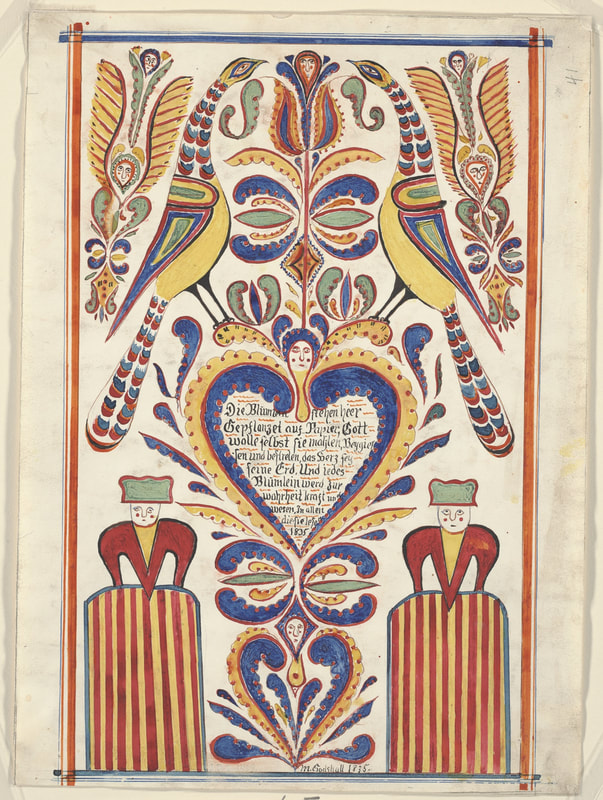 John Derstine Souder (1865-1942), fraktur illuminated manuscript, “Die Blumen stehen hier,” Telford, Franconia Township, Montgomery County, Pennsylvania, 1939. Modeled on a nineteenth-century Pennsylvania German manuscript. Shelf Mark FLP 105. Courtesy of the Free Library of Philadelphia Rare Book Department. At the close of Season 3 of Cloister Talk, sit back and relax with a hot cup of tea to reflect on Pennsylvania German manuscript culture and popular piety in early America, and future directions for the study of early American cultural and intellectual history. Reader and listener-submitted questions considered in this episode include the implications of The Word in the Wilderness for our understanding of the changing place of cursive handwriting instruction in American schools today, shifting approaches to the scholarly study of Pennsylvania German calligraphy and manuscript illumination advocated in The Word in the Wilderness, and possible reasons for the long decline of traditional illuminated manuscript culture in German Pennsylvania. The episode closes with some personal reflections on next steps forward for the field of Pennsylvania German material texts within the context of closely-aligned scholarly disciplines. Make a hot cup of tea, get cozy, and settle in for an enjoyable conversation as the paperback version of The Word in the Wilderness makes its debut! Listen to “A Second Cup of Afternoon Tea with Alexander Lawrence Ames: Answering Questions about The Word in the Wilderness, and Some Closing Reflections on the Book” here: https://anchor.fm/cloistertalk/episodes/A-Second-Cup-of-Afternoon-Tea-with-Alexander-Lawrence-Ames-Answering-Questions-about-The-Word-in-the-Wilderness--and-Some-Closing-Reflections-on-the-Book-e13s4op Founded by Benjamin Franklin, the Library Company of Philadelphia is the thriving epicenter of early American book history, and the inspiration of librarianship in America. James N. Green, Librarian Emeritus of the Library Company and a scholar of early American book history, introduces us to the history of the Library Company, the contours of its Pennsylvania German collections, and possible futures for the fields of material texts, Pennsylvania German studies, and cultural heritage preservation broadly conceived. Sharing personal memories of his long and distinguished career in librarianship and the scholarly study of the history of material texts, in this Cloister Talk interview Green also reflects on the unique library ecosystem that defines the Philadelphia region, the foundation of the Philadelphia Area Consortium of Special Collections Libraries (PACSCL), and the evolving civic role of libraries. Listen to “Cloister Talk Live! Dr. Franklin’s Library: A Conversation with James N. Green, Librarian Emeritus of the Library Company of Philadelphia” here: https://anchor.fm/cloistertalk/episodes/Cloister-Talk-Live--Dr--Franklins-Library-A-Conversation-with-James-N--Green--Librarian-Emeritus-of-the-Library-Company-of-Philadelphia-e13fjvu 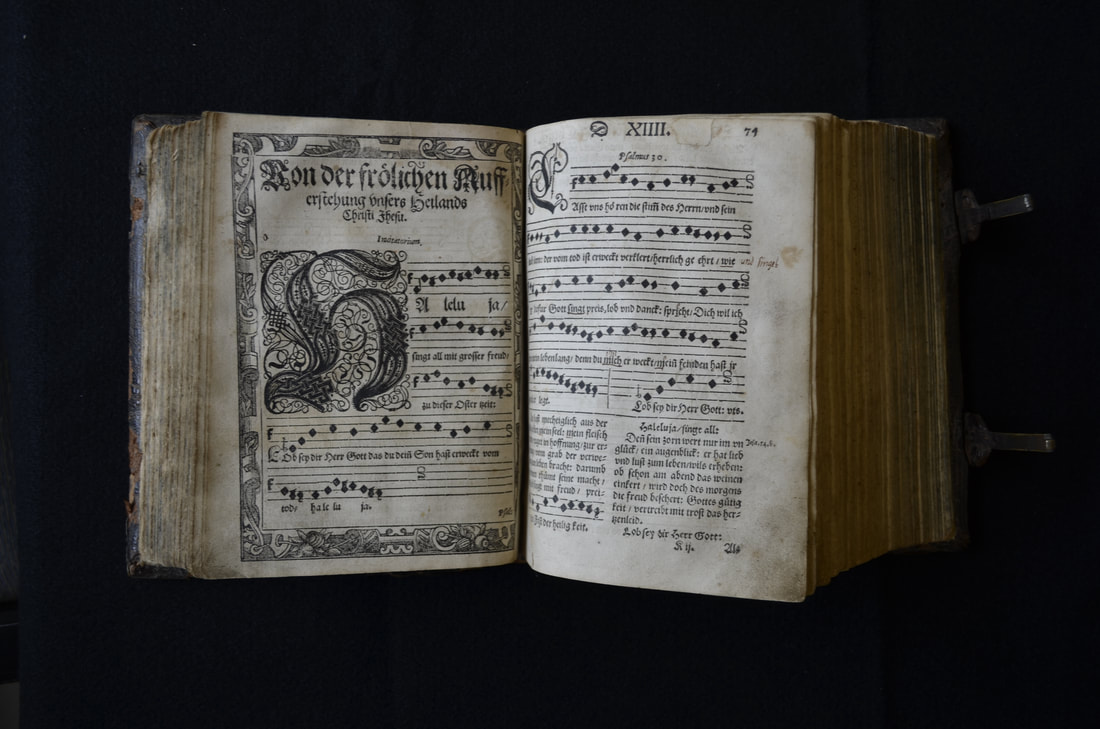 Das erste Teil der geistlichen Gesenge /von den wercken Jhesu Christi: und erstlich Von seiner gnad-reichen zukunfft und heiligen Menschwerdung. 1566. This volume has a Schwenkfelder provenance, having been inscribed by Maria Hübner in 1794. VR12-8 / L2004.0999.311. Courtesy of the Schwenkfelder Library & Heritage Center, Pennsburg, Pennsylvania. Mysticism is a central (if complex, debated, and often misconstrued) part of the religious DNA of early German Pennsylvania. The theology and devotional practice of the Schwenkfelders—a German-speaking sectarian group present in the colony—connected to early modern European mystical tradition in important ways, and the religious community practiced a rich manuscript tradition. This episode of Cloister Talk Live! takes us to the Schwenkfelder Library & Heritage Center to dive into the Library’s astounding rare book, manuscript, and decorative-art collections. Curators and scholars Candace Perry and Allen Viehmeyer introduce us to the institution’s holdings, consider how they relate to the material culture of other Pennsylvania German groups, summarize the state of Schwenkfelder studies today, and suggest new directions for the field. Listen to “Cloister Talk Live! A Mystical Heritage: A Conversation with Allen Viehmeyer and Candace Perry of the Schwenkfelder Library & Heritage Center” here: https://anchor.fm/cloistertalk/episodes/Cloister-Talk-Live--A-Mystical-Heritage-A-Conversation-with-Allen-Viehmeyer-and-Candace-Perry-of-the-Schwenkfelder-Library--Heritage-Center-e1335dq Few landmarks of early Pennsylvania history inspire awe and capture the imagination quite like Historic Ephrata Cloister in Lancaster County—a place of architectural beauty, spiritual devotion, mystical exploration, musical accomplishment, and tremendous historical significance to early-American book production and the manuscript arts. My trips to Ephrata over the years have been pivotal in shaping my perspectives on the research questions I explore in The Word in the Wilderness: Popular Piety and the Manuscript Arts in Early Pennsylvania, so I am delighted to have been able to make this thought-provoking conversation a part of Cloister Talk Live! In this episode, Ephrata Curator Kerry Mohn and Museum Educator Michael Showalter guide us through the history and significance of Ephrata and help us place the site within the wider context of early American religion and material culture, with a particular focus on Ephrata’s musical culture. Listen to “Cloister Talk Live! Incense Hill: A Conversation with Kerry Mohn and Michael Showalter of Historic Ephrata Cloister” here: https://anchor.fm/cloistertalk/episodes/Cloister-Talk-Live--Incense-Hill-A-Conversation-with-Kerry-Mohn-and-Michael-Showalter-of-Historic-Ephrata-Cloister-e12mano Nestled amid the rolling hills and verdant landscape of the Brandywine River Valley in Delaware, The Winterthur Library brims with rare books and manuscripts documenting material life in America, including early German Pennsylvania. Join Emily Guthrie, who until recently served as Director and NEH Librarian at The Winterthur Library, for a conversation about this remarkable repository of American history and culture, and how The Winterthur Library fits into the work of the Winterthur Museum and its surrounding 1,000-acre country estate. Ms. Guthrie, who recently took over as Librarian at the Library Company of Philadelphia, introduces us to the rich collections of Pennsylvania German rare books and manuscripts that reside in The Winterthur Library and tells us about her old side-gig as a shepherd and goatherd on the Winterthur estate. Well-known as one of the most prominent cultural institutions specializing in American history, the Winterthur Museum, Garden, & Library comes to life in dynamic new ways in this special episode of Cloister Talk Live! Listen to the episode here: https://anchor.fm/cloistertalk/episodes/Cloister-Talk-Live--Books-Along-the-Brandywine-A-Conversation-with-Emily-Guthrie--Formerly-of-The-Winterthur-Library-e1281hk Rare books at The Rosenbach showcase the incredible religious diversity throughout the Americas in the seventeenth, eighteenth, and nineteenth centuries. This episode of Cloister Talk brings us into the atmospheric West Library at The Rosenbach, to examine a few material texts that bear witness this early history, including The Rosenbach’s iconic copy of the Bay Psalm Book as well as its remarkable Doctrina breve, printed in Mexico City. This episode is a fitting follow-up to last week's conversation and offers an insightful peek into The Rosenbach's substantial holdings in early Americana. Listen to the episode here: https://anchor.fm/cloistertalk/episodes/Cloister-Talk-Live--From-The-Rosenbachs-West-Library-Religion-and-Early-American-Material-Texts--from-Cambridge--Massachusetts-to-Mexico-City-e11sem3 The multicultural life of early Pennsylvania included a vibrant Jewish community. In this episode of Cloister Talk Live!, Judith M. Guston, Curator & Director of Collections at The Rosenbach, discusses early Jewish settlement of the colony and the remarkable Gratz family holdings at The Rosenbach today, which document that early heritage. Ms. Guston also comments on the theoretical and methodological challenges of adopting a material culture approach to the study of past religious and spiritual life, and the research methods she has employed over the years to explore and interpret the complex history of the Gratz family and their community. She also reflects on the meaning of early Pennsylvania’s religious plurality for American society today. Listen to the episode here: https://anchor.fm/cloistertalk/episodes/Cloister-Talk-Live--At-The-Rosenbach-The-Other-Pennsylvania-Germans--A-Discussion-of-Early-Southeastern-Pennsylvanias-Jewish-Community-with-Judith-M--Guston-e11dujh |
Author:
|
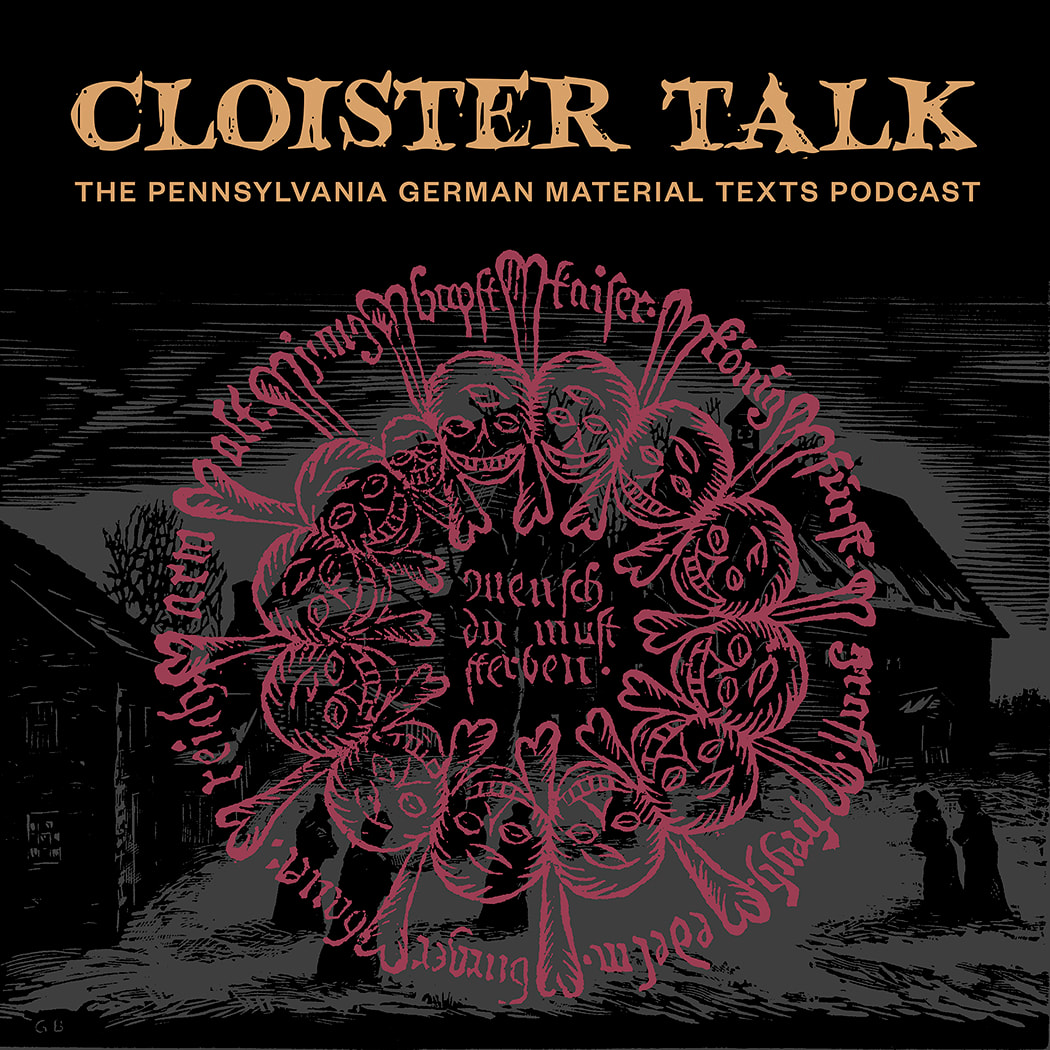
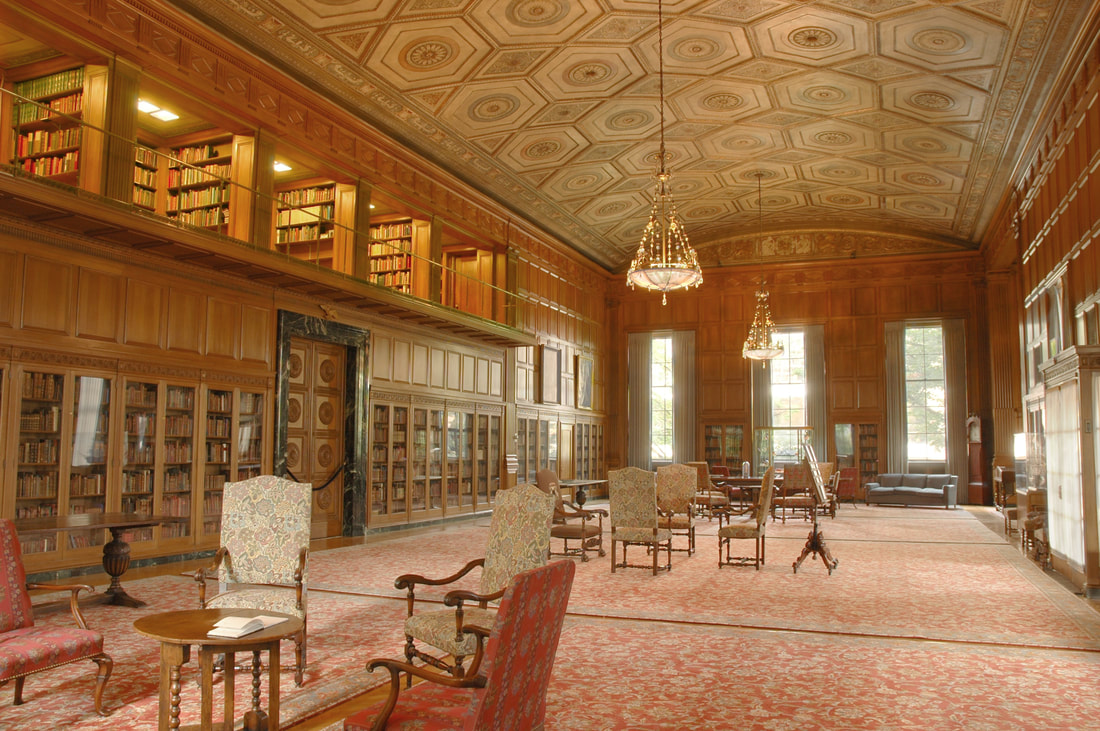
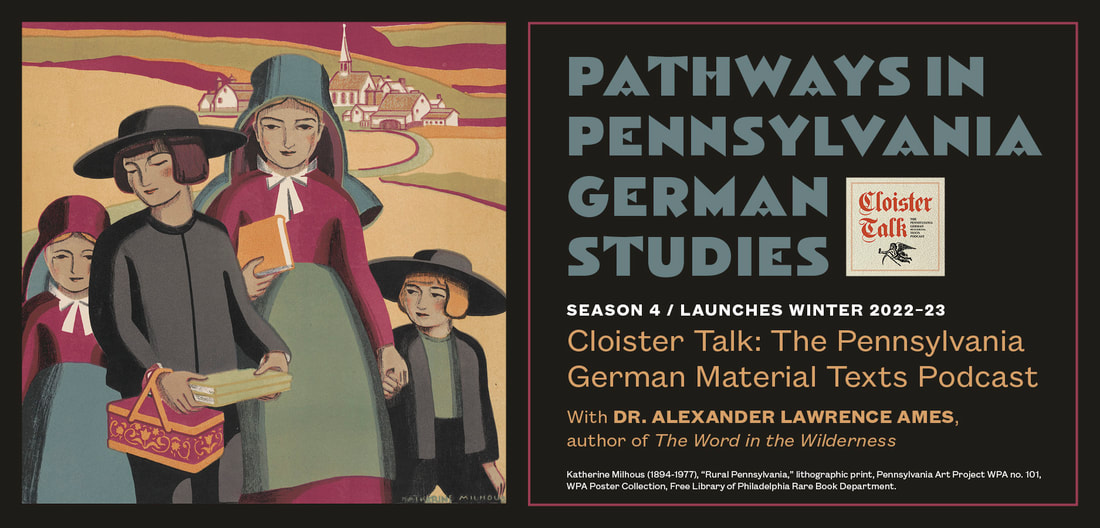
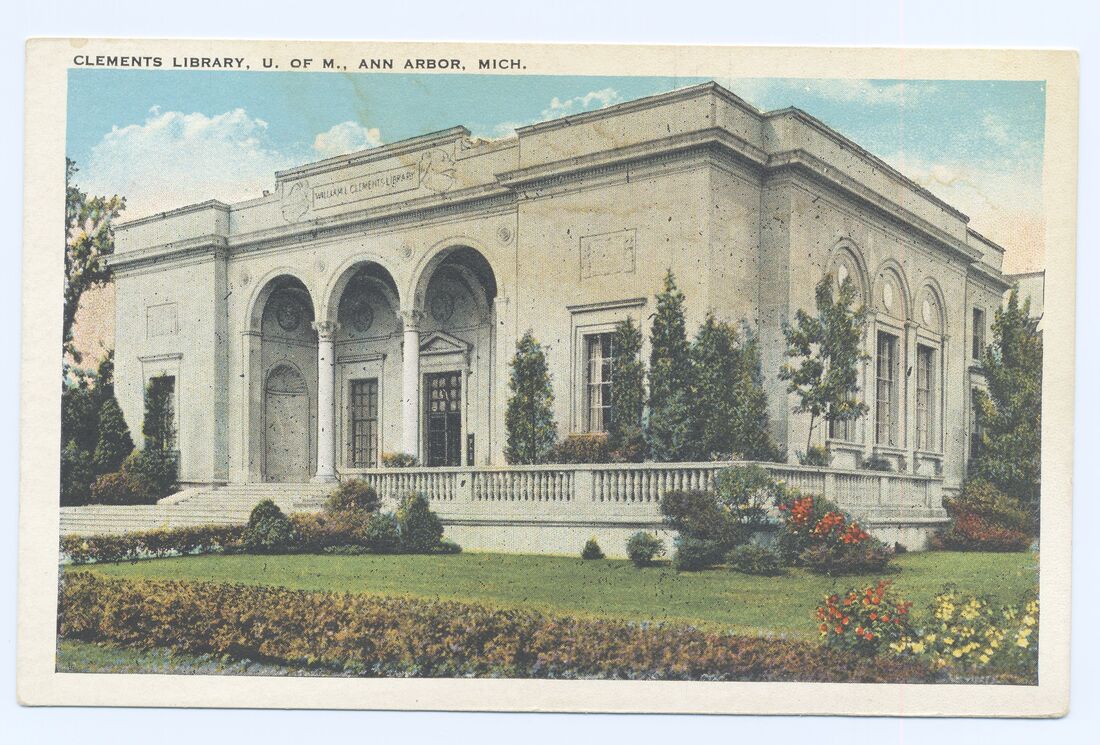
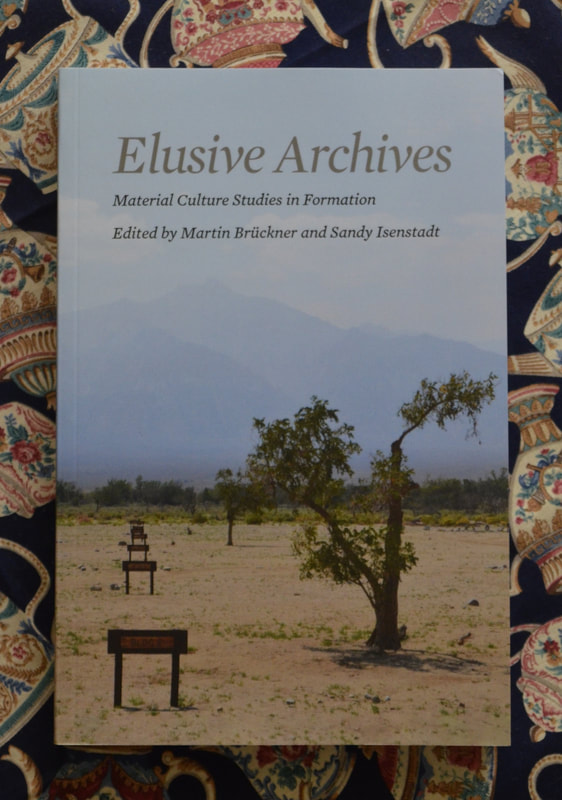
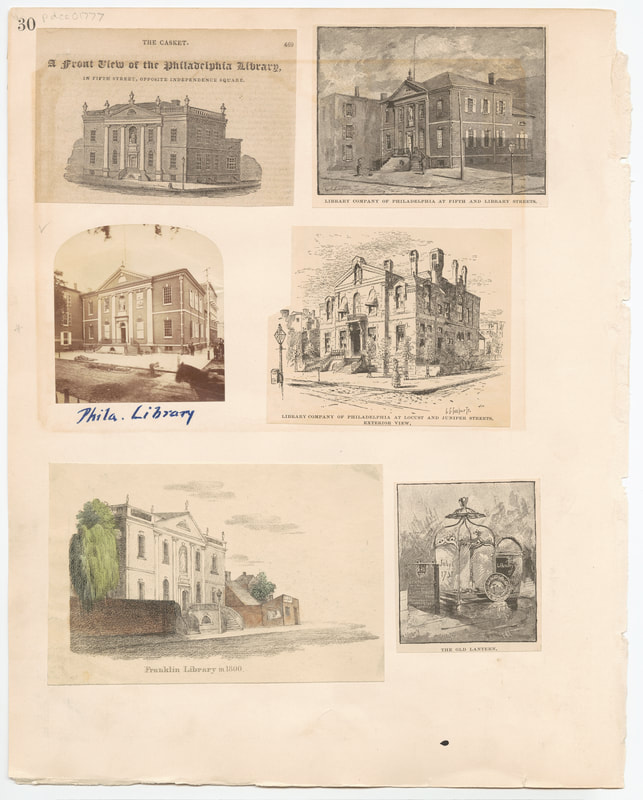
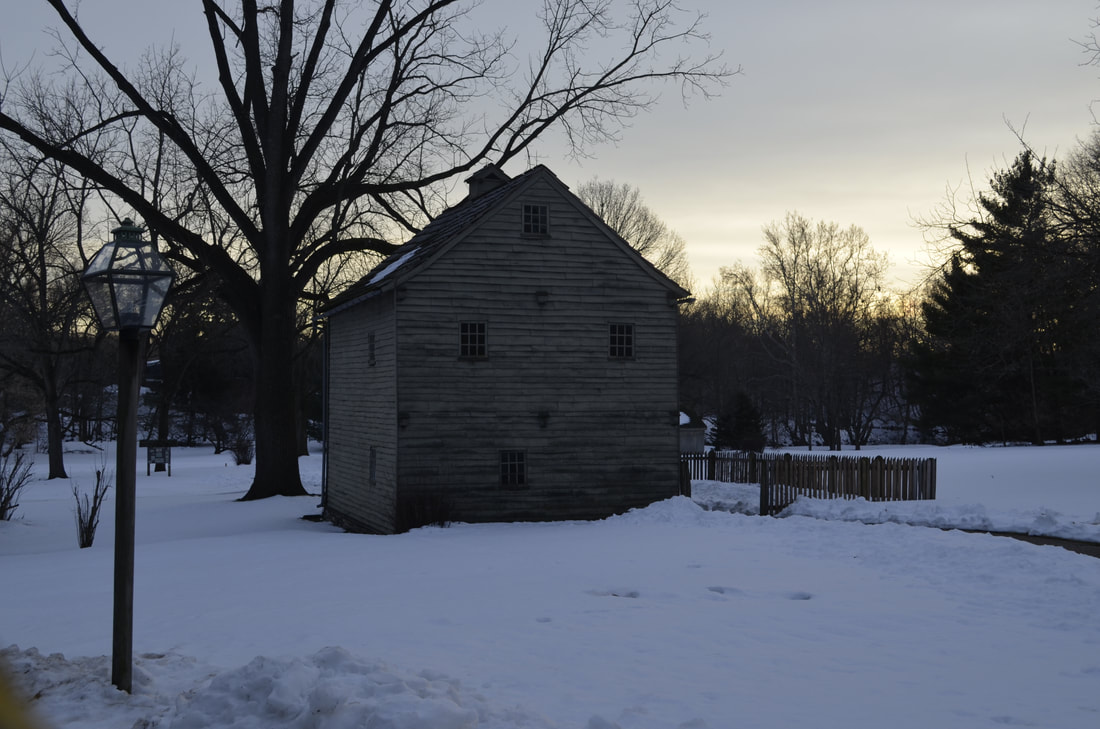
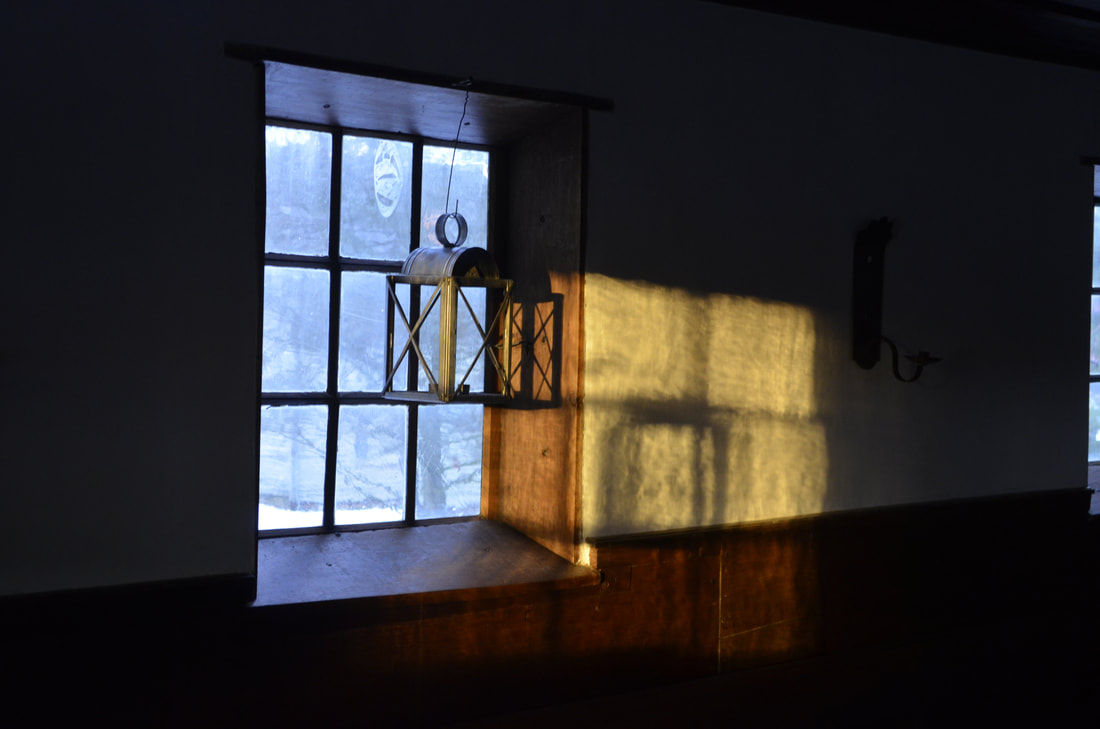
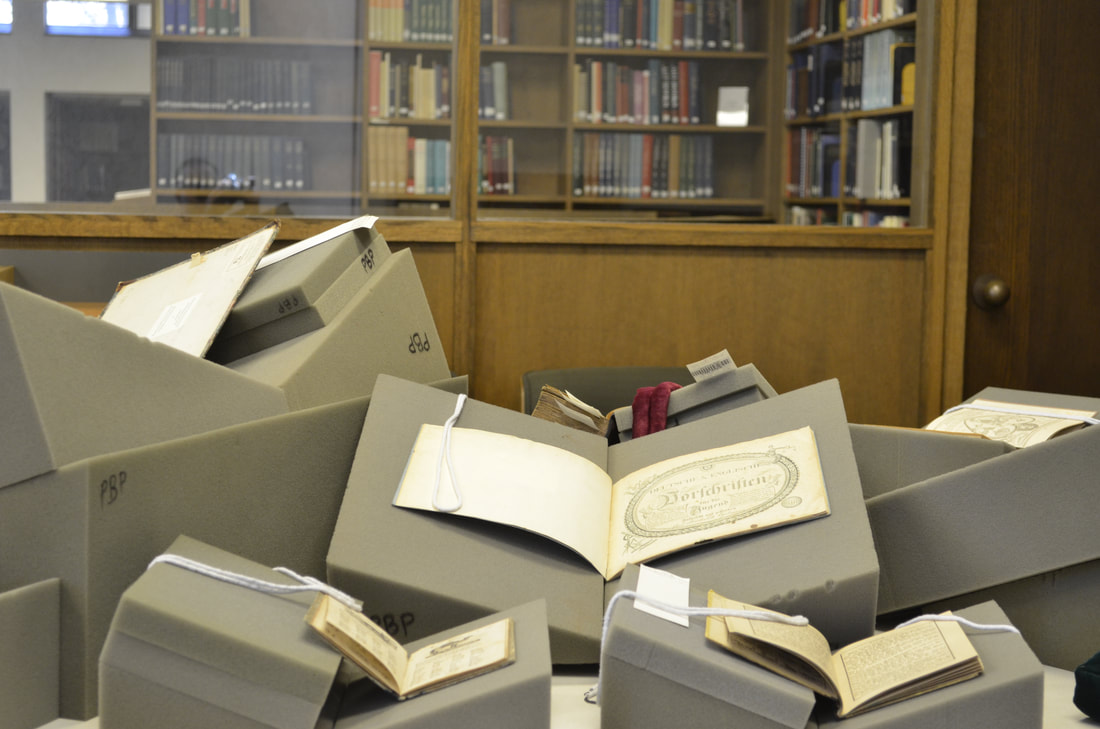
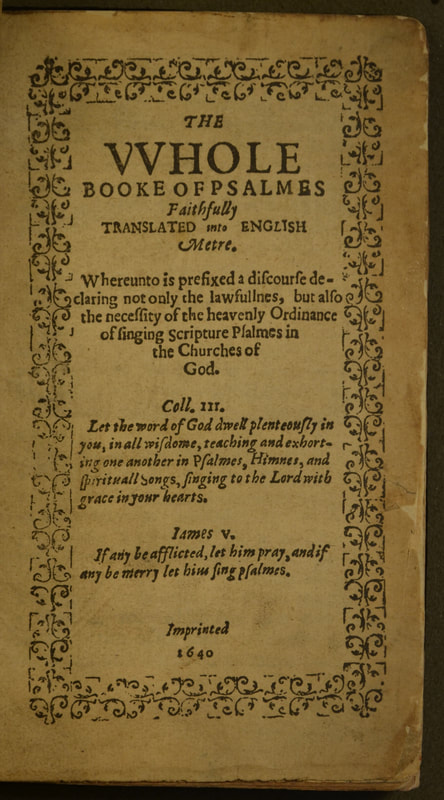
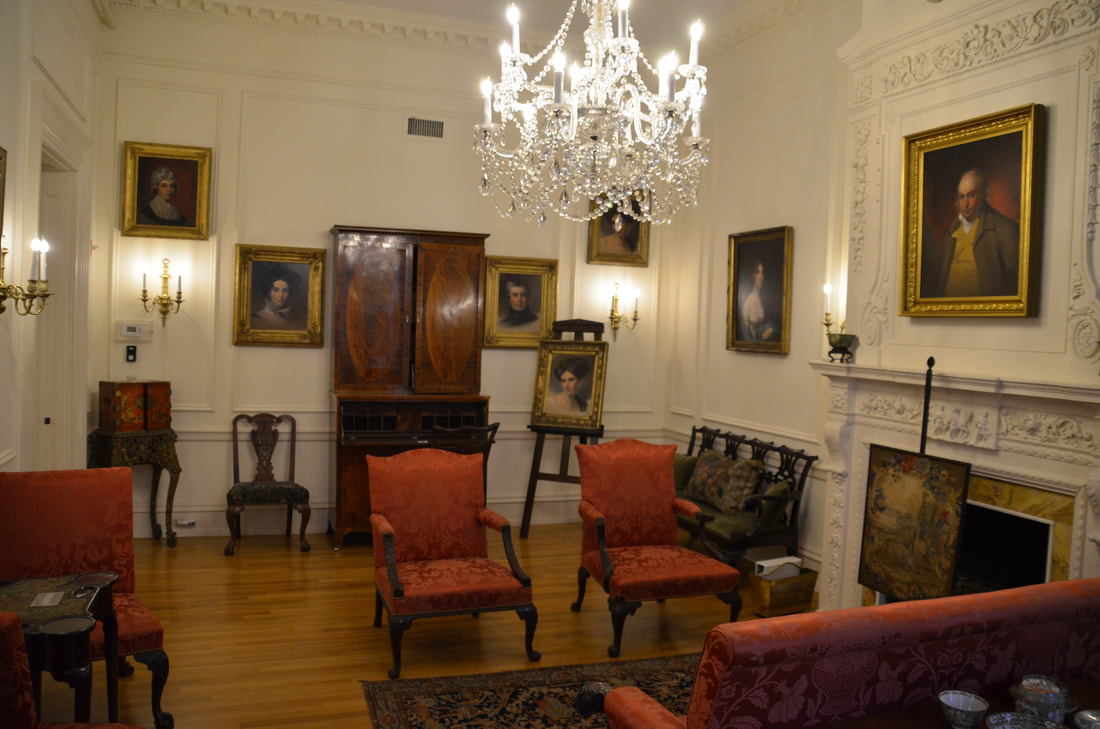
 RSS Feed
RSS Feed